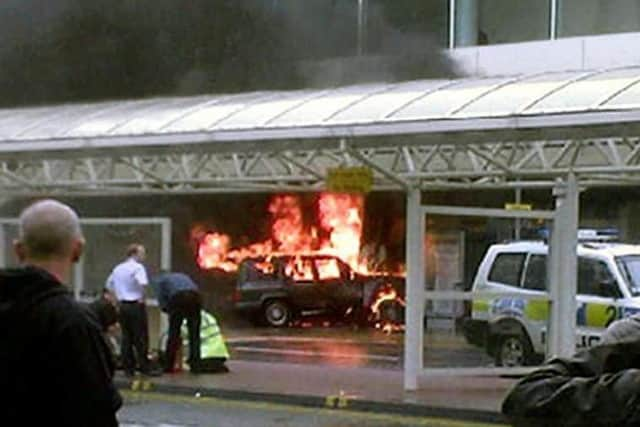National Records: Fears NHS workers would be 'victimised' after Glasgow Airport terror attack
Scottish Cabinet records show there were also concerns about reprisals against minority communities, with the police moving to offer reassurance.
Bilal Abdullah, an NHS doctor, and Kafeel Ahmed, an engineer, drove a Jeep filled with gas canisters into Glasgow Airport on June 30, 2007. Police quickly established a link between the attack and the discovery of two car bombs in London the day before.
Advertisement
Hide AdAdvertisement
Hide AdAbdullah was later given a life sentence, while Ahmed died a month after suffering severe burns in the Glasgow incident.


Several onlookers rushed to help the police after the jeep rammed the terminal doors. Alex McIlveen, a taxi driver, famously kicked one of the terrorists so hard in the groin that he tore a tendon in his foot.
Files opened for the first time by the National Records of Scotland reveal the contents of Scottish Cabinet discussions in 2007. Minutes from July 3 detail former first minister Alex Salmond's update to Cabinet in the days following the Glasgow attack.
They state the Government "had been at pains to try to minimise the impact of the incident on communities, and minority communities in particular, which might feel threatened or under suspicion as a result", adding: "The message from the first day onward had been that the individuals involved were responsible for their actions, not the communities from which they came, and the police had been clear that any acts of reprisal would be dealt with severely."
The minutes also say "consideration would be required on how to contain the reaction to the fact that a number of individuals involved in the London and Glasgow incidents were from the healthcare profession and any knock-on affect [sic] on the country's ability to attract top medical staff from around the world to work in NHS Scotland".
The Solicitor General later told the Cabinet the police "were working closely with migrant communities who might feel vulnerable and offering the reassurance that any incidents of a racial nature would be rigorously pursued". The minutes add: "He said that procurators fiscal would be treating any incidents very seriously, but, so far, signs were positive, with only a few isolated cases."
The minutes say the connection to the healthcare profession raised "two immediate issues" for the Government.
They add: "First, there was the question of whether it was necessary, and possible, to bolster the checks made on health professionals from overseas applying to work in NHS Scotland. Checks were currently made of those seeking employment at two levels, by immigration at the point of entry and by the NHS as an employer verifying qualifications and references in the usual way. The question of possible deficiencies in checks and what could be done to address these would be looked at in liaison with UK ministers.
Advertisement
Hide AdAdvertisement
Hide Ad"Second, was the need to avoid healthcare workers in any way being victimised as a group because of the connection to the profession of the individuals detained in association with these incidents.
"It would be important to get the strong messages across publicly that NHS staff, like the other emergency services involved in these incidents, had shown huge professionalism in dealing with the aftermath of the events and that health professionals from overseas played an important role in NHS Scotland."
Comments
Want to join the conversation? Please or to comment on this article.
